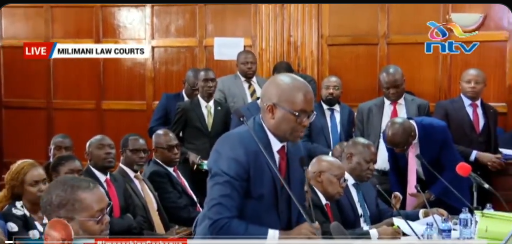The impeachment hearing of Deputy President Rigathi Gachagua has unfolded dramatically, marked by a tense exchange between Senior Counsel Muthomi Thiankolu and Senior Counsel Paul Muite.
As the proceedings began, Muite informed the Senate that Gachagua was seriously ill, which prompted a request to postpone the hearings.
However, the Senate rejected this motion, leading to a walkout by Gachagua’s legal team. Muite expressed his frustration over the situation, emphasizing the need for Gachagua to be present to defend himself against the allegations being presented.
Gachagua’s impeachment is based on 11 allegations, including claims of corruption, money laundering, and gross violations of the Constitution.
Specific accusations revolve around his interference in a significant procurement process related to a Sh3.7 billion tender for mosquito nets.
Testimonies from witnesses have detailed how Gachagua allegedly pressured officials involved in the tender, which raised concerns about ethical conduct and governance
The trial has highlighted a broader debate on accountability and integrity within the Kenyan government.
Despite the serious nature of the allegations, Gachagua’s defense team has contested the claims, arguing that many of the accusations are unfounded and misinterpreted.
They assert that his comments regarding “shareholding” in relation to government resources were taken out of context.
The defense maintains that the legal process must allow for fair representation and that Gachagua deserves the opportunity to fully address the charges against him.
As the trial progresses, the focus remains on the implications of these proceedings for Kenya’s political landscape and the standards of public office.


